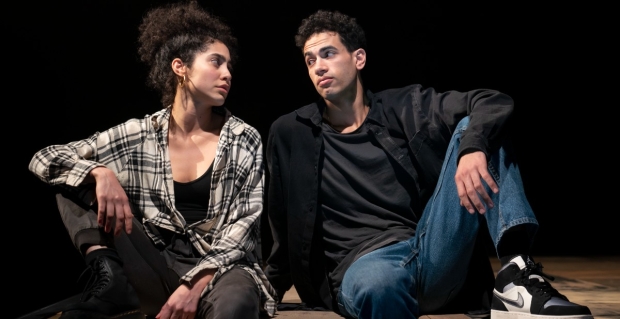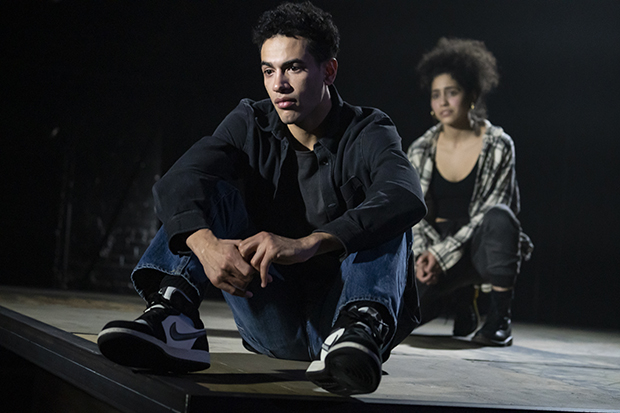Review: Sanctuary City Reminds Us of Theater's Power to Tell the Truth

(© Joan Marcus)
When Sanctuary City abruptly closed in March 2020 mid-previews — a victim of the citywide pandemic theater shutdown — playwright Martyna Majok went straight into bargaining mode. "What if we do one more show [and have it reviewed] really quickly?" she recently told me. "It felt so important to have some sort of record that this thing had existed, because it felt like without the review…You know, if a play falls in the woods?"
It took 18 months, but the time has come for the dramatist to finally get her wish. Sanctuary City is back onstage at the Lucille Lortel Theatre, where New York Theatre Workshop left the set standing for the past year and a half, finally getting the chance to complete its entire run. This is the kind of piece that Majok, a Pulitzer Prize winner for Cost of Living, does best, a work of majestic beauty that rips your heart out and shows it to you in its effort to tell the truth about experiences that the largely upper-middle-class audiences wouldn't otherwise have.
Set between 2001 and 2006 (pre DREAM and DACA) in Newark, New Jersey, the principal characters of Sanctuary City are initialed B (Jasai Chase-Owens, the beating heart of this enterprise) and G (Sharlene Cruz, a tough softie). Both born in unspecified other countries, B and G were brought to the United States while very young. Now in their teens, B's mother is determined to return home, while G's mom, trapped in an abusive relationship that makes life hell for both women, is determined to see her and her daughter become naturalized citizens.
Over their four years in high school, B and G serve as each other's refuge from the world, supplying companionship, shelter, food, and a familial love that they don't see at home. As she departs for college in Boston, they make wedding plans in order to get him a green card. But time — and a man named Henry (Austin Smith, who is just great in the role) — has a funny way of altering their perspectives and changing their priorities.

(© Joan Marcus)
The daring first half of Sanctuary City is a disorienting series of short, clipped scenes with similar dialogue and a fluid chronology that represent the passage of time through life's ordinariness. It may feel like Majok is spinning her wheels a little, but it's worth going for the ride; the play takes on a stylistically more traditional structure as things start to fly off the handle and the relationships build to a shattering crescendo.
Majok, an astute observer of the immigrant experience in America through dramas like Ironbound and queens, is questioning the point of the struggle itself: Why do people come to America when the streets aren't paved with gold and haven't ever been? What happens to these in-betweeners, the folks who get stuck in under-the-table jobs with no real chance for advancement? And how do you take care of yourself in a place that doesn't seem to want you? The open-endedness of these questions, and the fact that answers have gotten exponentially harder and harder to find, even over just the last four years, make Sanctuary City all the more devastating.
Majok's script is expertly matched by the direction of British theater wunderkind Rebecca Frecknall, whose crystalline work is present in every single detail, yet simultaneously invisible. This is a play that has been rigorously directed, from Mikaal Sulaiman's foreboding sound design, to Isabella Byrd's frenetic lighting effects, to Tom Scutt's mere suggestion of a set, to the three authentic and lived-in performances. You see Frecknall's fingerprints everywhere, and still, even when the design is at its most cataclysmic and the acting is at its sizzling peak, it all feels so natural that it's almost like there was no director at all. That is an impressive feat that can only be felt onstage.
Sanctuary City is a great way for New York Theatre Workshop to return to live performance, and is almost timelier now, just weeks after the 20th anniversary of 9/11, than it was even in March 2020. More than anything else, though, it's a testament to theater's ability to give voice to the voiceless in deeply honest, profoundly moving ways. You're not likely to see a more powerful 100 minutes than this.











